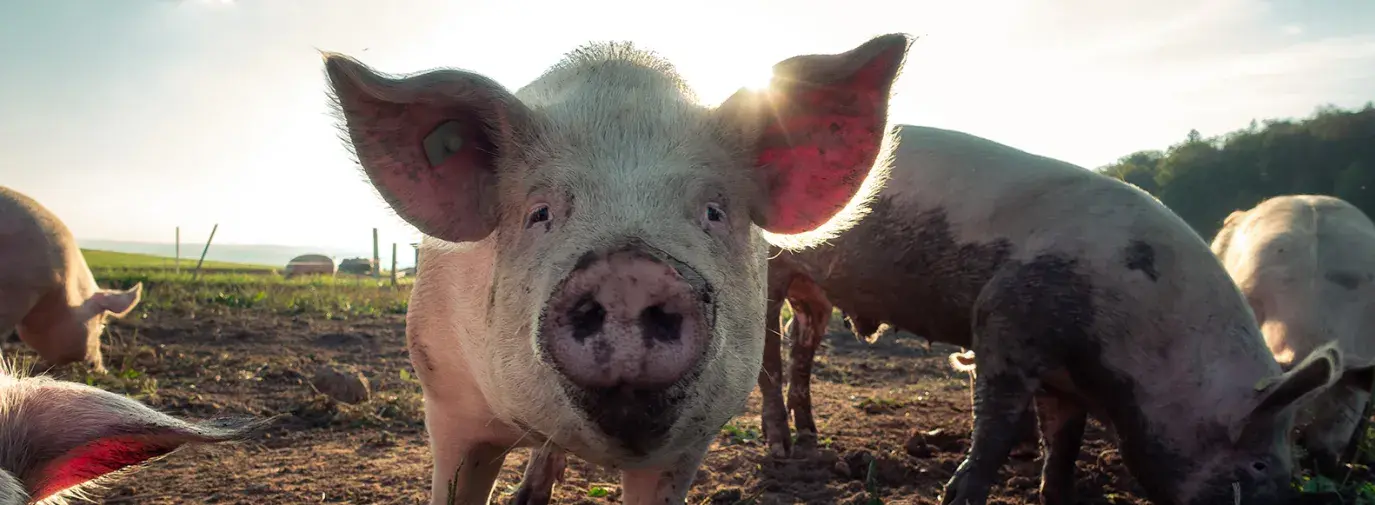
In October, the United Nations Intergovernmental Panel on Climate Change (IPCC) published a historic report estimating that governments only have 12 years to meet the Paris Agreement’s goal of holding the increase in the global average temperature to 1.5°C above pre-industrial levels. While government action is critical to meet this goal, citizens can also help. When many of us take action together, it’s powerful.
One way individuals can help cool the climate is by going vegan or vegetarian, or eating less meat. A 2016 Oxford University study found that vegetarian and vegan diets can reduce food-related emissions by 63 percent and 70 percent, respectively, as compared to what the researchers called a “business-as-usual diet” with high amounts of red meat.
You can support plant-based eating with more than just your fork, however. Socially responsible investors are getting in on the act, too, by supporting plant-based businesses with their portfolios.
Plant-based and alternative meat businesses are booming: From 2013 to 2017, plant-based product purchases increased by 62 percent, and in 2017, sales of vegan or vegetarian food totaled $2 billion US dollars, according to Innova Market Insights and Statista, respectively.
Enter plant-based investing—a new, promising strategy within the larger socially responsible investing (SRI) movement that supports a global transition from animal- to plant-based products.
Innovative plant-based “meat” start-ups like Beyond Meat and Impossible Foods have been the darlings of the venture-capital set for the past few years. (Note: Some of these companies, including Impossible Foods, use genetically modified ingredients.) But you don’t need millions to get involved in the plant-based investing movement, just the know-how.
Plant-Based Investing
Plant-based investing goes by many names; you might hear it called vegan investing, humane investing, or cruelty-free investing. What all of these approaches have in common is the intention to support plant-based industry as a means to transition away from practices that either harm animals or promote unsustainable animal agriculture. Green America uses “plant-based investing” as a blanket term to best explain this movement.
Plant-based investors may do one or more of the following:
- Seek out investments in businesses that offer plant-based products, as well as plant-based alternatives to common animal-based products.
- Exclude investments in companies involved in animal slaughter, abuse, testing, and exploitation from portfolios.
- Participate in shareholder activism to spur positive changes in companies regarding animal welfare.
Since plant-based investing is still new, what each term means varies among investment managers and advisors, says Brenda Morris, a vegan financial planner and founder of Humane Investing LLC.
“At Humane Investing, we may invest in a retail company that sells fur, but we’d advocate for changes in their practices so that they stop selling fur,” says Morris. “Excluding any company that sells products affiliated with animal exploitation—for example, airlines with leather seats on the planes—will have very little impact on the company’s behavior. I will not go that far because I believe engagement is a more effective strategy.”
How to Do It
If you’d like to try plant-based investing on your own, here are a few ways you can take to get started.
Screen for plant-based companies
You can positively screen for companies that are on the cutting edge of plant-based products. And, you can screen companies that are involved with animal exploitation and abuse out of your portfolio.
To do so, you can do your own research, or find a socially responsible investment advisor to help. Any SRI advisor is well-versed in screening for social and environmental issues, and some now specialize in plant-based investing.
To help his clients, Tom Nowak, founder of the investment advisory firm Quantum Financial Planning LLC, says he develops a portfolio of about 30 stocks that are screened based on the criteria laid out in his book, Low Fee Vegan Investing (CreateSpace, 2014). Like many advisors, Nowak’s screening criteria isn’t available to the public, but for those who like to do their own research, he recommends CrueltyFreeInvesting.org, a nonprofit website where over 4,000 companies have already been screened for animal abuse and exploitation.
He cautions that just because a company is listed on the site doesn’t mean it’s an ethical company across the board: “A socially responsible investor may avoid [some of the companies listed on the site] because of their governance or hiring practices,” he says. “Still, it’s a great start because it allows advisors like me to show clients a list of stocks that have already gone through the cruelty-free filter, and now we can apply other filters to it.”
Check out the US Vegan Climate Index
The US Vegan Climate Index debuted in June 2018 on Bloomberg under the ticker VEGAN. Created by Beyond Advisors, a vegan investment products company, the Index is a collection of US large-cap stocks that have been screened according to environmental and anti-animal-abuse principles. Since extracting and burning fossil fuels continues to spur global warming, the Index also excludes oil and gas companies.
“I’ve never met a vegan who’s a climate change-denier,” says Claire Smith, CEO of Beyond Advisors. “So we’ve combined those two elements and called it Vegan Climate because animal agriculture is an enormous contributor to climate change.”
While you can’t invest directly in an index, Beyond Advisers has created an exchange traded fund (ETF) that mirrors the US Vegan Climate Index. The ETF is currently pending SEC approval and is expected to launch in January 2019.
Use your shareholder power
Shareholder activism is already making a visible impact on the American food industry.
In September, the New York State Pension Fund, which owns at least $344 million worth of shares in McDonald’s, made headlines when comptroller Thomas DiNapoli wrote a letter to McDonald’s imploring the fast food giant to adopt a more humane chicken welfare policy. Groups like the Humane Society charge that chickens from McDonald’s and other fast food companies are bred to grow at an unnatural pace and live in overcrowded conditions. Since Aramark, Burger King, Kraft Heinz, and Subway have pledged to give chickens more floor space by 2024, McDonald’s is considered the laggard in the industry.
In response to the letter, McDonald’s announced commitments this fall to improve chicken welfare, including raising chickens in safe environments that promote natural behaviors, implementing monitoring systems, and embracing third-party audits, as reported by an October 2017 company press release.
Also, in 2016, Green Century Capital Management, a Boston-based SRI firm, filed a shareholder resolution at Tyson Foods, the country’s second largest processor of chicken, beef, and pork, calling on the company to produce plant-based eating options. Following that resolution, as well as a robust grassroots campaign by the nonprofit Mighty Earth, Tyson became an investor of Beyond Meat and started a $150 million venture capital fund supporting alternative protein development.
Though Jared Fernandez, shareholder advocate at Green Century, says he can’t say for sure that Tyson made the investments solely because of Green Century’s efforts, it does seem that the shareholder resolution, coupled with the consumer campaign, nudged the company in the right direction.
Fernandez notes that the dialogue with Tyson started around the notion that going plant-based is good for business. “Ultimately, if you’re not addressing a burgeoning market like this, you’re restricting your own access within the greater market,” he says. “That can impact a company’s bottom line and make a company seem like they’re not exploring all the opportunities for growth they could.”
To support change within companies, voting during the upcoming proxy season for resolutions demanding plant-based food products and an end to animal abuse and exploitation is a gradual but promising strategy. To see if there will be shareholder resolutions in 2019 asking companies to address animal cruelty or offer plant-based products, check out Green America’s shareholder focus list, which is updated annually shortly before the spring shareholder season.
Seeds of Change
The shift to plant-based eating is a global movement: 70 percent of the world’s population is currently opting for less meat or no meat at all, according to GlobalData.
The rise in plant-based eating is on track to influence more corporations to develop alternative meat products and more financial institutions to create plant-based investing products. For example, in September, a New Zealand-based investment management company, Pathfinder Asset Management, announced that it will remove companies involved in animal testing and animal products from its stock portfolios. And in 2017, Walmart asked its suppliers to identify products that could be marketed to vegan and vegetarian consumers.
Actions like these anticipate a change in consumer sensibility—even a small, personal choice like buying a soybean burger can be a form of investment in our planet’s future.
“Meat and dairy are huge parts of our everyday lives, and there’s a huge infrastructure in place to deliver them,” says Nowak. “But if consumer preference changes and consumers want plant-based products that factory farms aren’t designed for, [those farms] could turn into stranded assets,” i.e. assets that have lost their value.
INVESTOR RESOURCES
- Cruelty Free Investing (CFI): A nonprofit developing investment resources that protect animal rights. Publishes lists of dedicated plant-based investment advisors and programs on its website, CrueltyFreeInvesting.org.
- ShareholderAction.org: Green America’s Shareholder Focus List is our annual list of social and environmental shareholder resolutions to watch, including any on animal rights.
- GreenPages.org: Green America’s directory of green businesses includes SRI advisors who can help you get started with plant-based investing.







